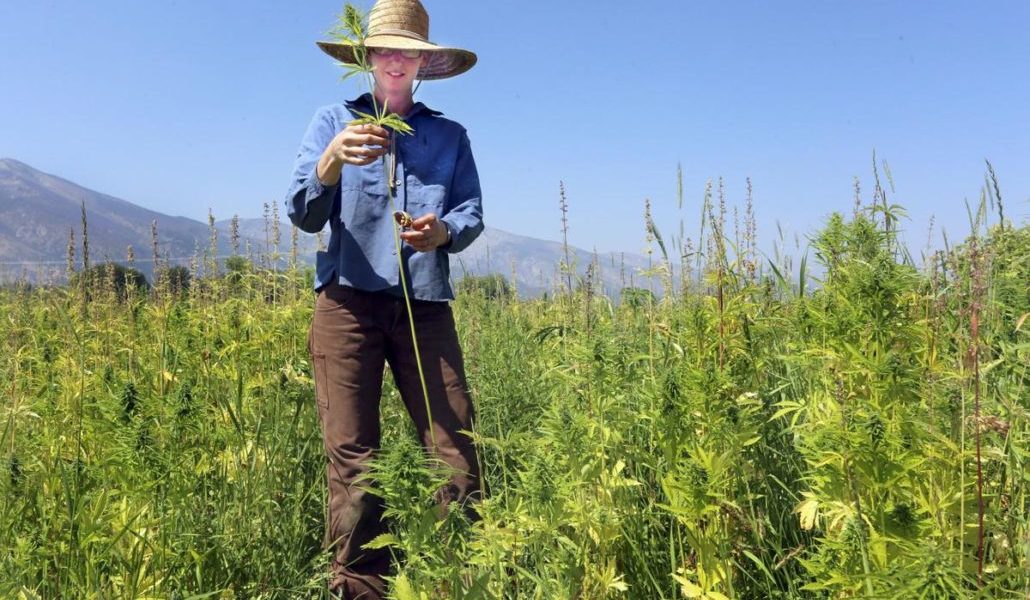By Andrew Graham, WyoFile.com
ALBIN—Ron Rabou is no hemp-necklace-wearing hippy.
A Trump 2020 flag flies at the entrance to his driveway. A hanging in his office reminds him that “God made a Farmer.” The eastern Wyoming agriculturalist has never tried marijuana, not even in college, he said.
None of that stopped Rabou from trying his hand at growing hemp this year. Rabou is growing wheat, peas, garbanzo beans, flax, saffron, millet and, yes, hemp on his farm near the Nebraska state line.
The hemp crop takes up 170 of the 8,000 deeded and leased acres Rabou has under cultivation. The venture represents a big bet on a new crop; there is little research to guide him and no federal farm insurance to cover him, Rabou said. He stands to lose around $100,000 if the crop fails, he estimates
“We really stuck our necks out,” he said.
For Rabou, the experiment’s risk is outweighed by future benefits for his business, and, he hopes, his economically challenged state. Rabou is betting on the crop “not because I’m in love with hemp, but because I’m in love with Wyoming agriculture,” he said.
In hemp, he sees the potential for a new Wyoming industry — not just in fields but in processing facilities to refine the plants into CBD oil, seeds for protein or fiber for rope and clothing.
The nascent industry won’t achieve its potential unless the state embraces it, he said.
Such an embrace has come haltingly.
Former Gov. Matt Mead didn’t sign the first hemp bill in 2017. Such a gubernatorial gesture is merely symbolic — unsigned bills become law anyway. But it was a sign of disapproval to industry advocates and farmers and a nod from Mead, a former federal prosecutor, to the concerns of law enforcement agencies that opposed hemp farming out of marijuana concerns. Even when passing the legislation, lawmakers balked at putting several hundred thousand dollars into testing equipment needed by the Wyoming Department of Agriculture. The fiscal conservatism delayed the first plantings by several years.
Bunky Loucks, a recently retired Republican representative from Casper, even tried to raise funding for the testing equipment privately, he said, but was unsuccessful.
Then there is Wyoming law enforcement, who have tried to prosecute hemp farmers growing both in and outside of Wyoming as marijuana traffickers.
“Law enforcement needs to get out of the way,” Loucks said.
Several weeks ago, Rabou stood at the witness stand in a courtroom in Cheyenne and testified in defense of both the plant and his neighbors. Prosecutors sought to put those neighbors, a mother-and-son hemp farming team, in prison for decades by charging them with a number of marijuana-related felonies. A judge threw out the charges against both the Egles and two employees and friends following a preliminary hearing.
DCI agents raided the Egles’ farm in November 2019. That year, Wyoming Highway Patrol officers also seized the loads of two separate trucks carrying CBD products and hemp plants.
In one case, a judge threw out all but one of six felony charges against an Oregon farming family whose load of hemp plants and CBD oil was seized en route to Colorado. In another, the owners of a truckload of plants had to pay $10,000 to get their product out of custody, though no charges were ever filed, according to investigative documents in that case.
In the summer of 2018, health food stores in Jackson took CBD products off their shelves after visits and warnings that the products contained trace amounts of THC from DCI agents, according to the Jackson Hole News&Guide.
Those stories get noticed by those in the industry, and may have caused some businesspeople to look askance at Wyoming, a national advocate for the hemp industry said.
“Any time you think law enforcement could steal your crop, that causes economic harm,” Rick Trojan, president of the national Hemp Industry Association and an advocacy group called Vote Hemp, said.
In other states, “they don’t have interference from law enforcement, they have cooperation from law enforcement,” Trojan said. “The police are very understanding. They go to all these conferences. It’s a different culture.”
This growing season, a little more than 1,000 acres of Wyoming farmland is licensed for growing hemp, according to the Department of Agriculture. The state issued 11 licenses to producers, 13 to operations that intend to produce and process, and three to simply process the crop.
The state is well behind some of its neighbors. In 2018, Colorado had 21,578 acres licensed for hemp production, Montana had 22,000 and North Dakota had 2,778, according to a report by Vote Hemp.
The Hemp industry’s experience of trying to establish a profitable foothold here reflects Wyoming’s broader struggle to diversify its economy. Agriculture is the state’s third largest industry, but by economic measures falls well behind the frontrunners, tourism and energy. Hemp could help Wyoming agriculture grow. But cultural and political resistance has discouraged, or at least slowed, its potential.
“Wyoming is going to have to really try” to attract the new industry, Rabou said. “We’re not going to just be able to say ‘yeah, you can come here.’ We’re gonna have to tell this story. But, because of this case [against the Egles], the exact opposite is happening.”
“Everyone has [worries] about marijuana,” he said. “What I have an interest in is a commodity.”
Hemp and marijuana come from the same plant — cannabis. Grown one way, cannabis can produce intoxicating concentrations of tetrahydrocannabinol (THC). The psychoactive compound is now decriminalized or legalized in most states, but is still entirely illegal in Wyoming and 10 others.
Grown in another way, cannabis produces hemp with almost no THC.
Hemp has a number of commercial uses, depending on how the plants are grown. The cannabinoid compounds including CBD (cannabidiol) it produces are touted by many as natural medicine for a wide range of ills.
The plant also produces strong fibers used in clothes, rope and other textiles. Hemp fiber can even act as a building construction material, Trojan said.
Proponents also tout the crop’s agricultural benefits. The plant sucks up toxins and has a large taproot that aerates the soil, making it an effective rotational crop that can improve the yield of whatever is planted next, Trojan said.
Rabou has a buyer for hemp’s protein-rich seeds. Hemp seeds are sold whole or powdered, and marketed toward vegans or health-conscious eaters. They carry more vitamin and nutritional value than other protein-rich seeds, Rabou said.
Cannabis produces seeds when pollinated, meaning Rabou’s fields contain both male and female plants. The pollen can float a long way, according to Josh Egle, whose family farm is within five miles of Rabou’s.
Egle leases some land to Rabou, whose hemp crop abuts the house Egle’s family built in the 1970s. The Egles have deep roots in eastern Wyoming. A family cemetery sits on the property. Photographs of his great grandfather — who rode in Buffalo Bill’s Wild West Show, according to Debra Palm-Egle, Josh’s mother — adorn the walls inside.
The pollination from Rabou’s plants is detrimental to both marijuana and CBD growers, who seek buds produced by the female plants. Pollinated plants produce more seeds and lesser buds, hence the 1970s era nickname “sinsemilla” — Spanish slang meaning without seeds — for potent strains of marijuana.
Egle believes the pollen from Rabou’s male crops makes it unproductive to grow either illegal marijuana or legal CBD within the surrounding five or six miles.
Egle’s own experimental crop, which he began after he says he grew frustrated with delays in implementing a licensing process, is the reason Laramie County prosecutors sought to send him and his mother to prison for decades. Egle admits to growing his crop without a license.
Agents with Wyoming’s Division of Criminal Investigation raided the farm in November 2019, after believing they had spotted marijuana plants drying inside a barn. A DCI investigator did not have warrants when they first visited the property, but said in charging documents he approached the barn looking for someone to talk to while investigating a tip from an anonymous source in the area.
DCI agents later returned with a warrant and seized 700 pounds of hemp. When tested, the crop contained over 0.3% THC, the legal limit for hemp. The THC quantities were still an entire decimal point below the levels desirable for getting stoned — most legal recreational marijuana today contains at least 15% THC, and DCI’s highest test result came back at just 0.6%.
Police and prosecutors still charged both the Egles and contractors who were on the property the day of the raid with felony crimes for growing and trafficking marijuana.
“I don’t know why people drink Natural Light beer either,” DCI Special Agent John Briggs, who led the investigation, later said during court testimony. “But they sell it.”
The analogy doesn’t hold up: Natural Light’s alcoholic content is equivalent to most mass-produced beer. The “light” advertises a lower calorie count.
Ignorance about hemp and marijuana — and the distinctions between them — drive arrests that are ultimately a waste of taxpayer resources, as well as damaging to hemp businesses, Trojan said.
“It’s just a matter of dismantling that training, that misinformation,” he said. [Trojan’s organization provides hemp education to law enforcement agencies that pay for it.]
In the southwest corner of the state, truckers carrying hemp product through Wyoming have been accused of carrying marijuana.
In January 2019, highway patrol officers seized a tractor trailer entering the state with a truckload of hemp plants and barrels of wax and oil containing CBD. The truck was seized at a border point of entry after a driver presented paperwork that indicated there was some THC in his load.
The plants tested under 0.3% THC, while some of the oil tested as high as 2.2%. The Oregon farmers, who were shipping the product to a buyer in Colorado, hired Hathaway and Kunz, a Cheyenne firm.
Lawyers from the firm contacted Uinta County Attorney Loretta Howieson to try and get the load released. Howieson countered that at the time of the seizure — just before lawmakers passed Wyoming’s second legalization bill — the hemp was illegal.
“On January 17, 2019, there was no legal distinction in Wyoming between hemp and marijuana,” Howieson wrote, according to communications entered as evidence in the civil suit the hemp farmers ultimately filed against the Uinta County Commissioners, Wyoming Highway Patrol and Attorney General Bridget Hill.
“If a product contained THC in a measurable quantity it is in violation of Wyoming law and subject to summary forfeiture and criminal investigation,” Howieson wrote in response to the lawyers’ requests for the truckload’s release.
After the farmers filed their civil suit, Howieson brought six felony charges against them, employees and the company buying the product. A judge dismissed five of the charges and the prosecutors later dropped the sixth.
In February 2019, highway patrol officers seized another truck at a port of entry in Uinta County. This truck carried 35 bags of hemp, according to a subsequent DCI investigation into the case. The truck’s bill of lading listed only 31 bags, and one “particular bag had a very strong odor to it that was consistent with High Grade Marijuana and appeared ‘different’ than the other bags,” according to the investigation.
The truck was seized, along with what ultimately turned out to be around 7,200 pounds of hemp, and turned over to DCI for testing. Only two of the bags tested above 0.3%. One had 0.35% THC, and another had 0.32%, according to the DCI investigation. The rest were under the legal limit.
DCI ultimately released all but three of the bags back to Penelope & Anatole, LLC, the company that had bought the hemp from the farmers. According to the DCI report, six DCI officers, including Briggs and now-Acting-Director Forrest Williams, met with legal counsel for the hemp buyers to supervise the loading of the bags into a truck.
To get the crop back, the hemp buyer’s lawyer handed over a $10,000 cashiers check. The DCI report described the payment as “part of settlement negotiations” between the company and Howieson.
Williams declined an interview request and asked for emailed questions from WyoFile. He did not respond to the questions about DCI concerns over enforcing marijuana laws as hemp growing increases in Wyoming.
Back at the Wyoming-Nebraska line, Egle and Rabou say they don’t know which way the hemp industry will go here. A CBD boom sent prices for that product through the roof, but then they dropped precipitously as supply overwhelmed current demand.
In Montana, licensed hemp acreage shot up to 50,000 last year before shifting to just 14,000 in 2020, Andy Gray, hemp program coordinator at the Montana Department of Agriculture, said.
“A lot of growers spent a lot of money hoping to make a lot more money last year,” Gray said, “and they just didn’t.”
Egle sees the other products — fibers, feed and protein seeds like Rabou’s — as the more promising crops for Wyoming in the long term.
His ordeal with law enforcement has not dissuaded him from pursuing hemp here. “I feel a sense of duty in Wyoming now,” he said, “that I’ve got to keep this going.”
This year, Egle missed out on the growing season because of the trial and the money he had to spend on lawyers. Rabou’s lease, however, means he can still walk outside and see hemp plants waving in the breeze just behind his house.
Perhaps a month away from the harvest, Rabou’s plants appear to be succeeding. Many are as tall as Rabou or taller, the distinct seven-fingered cannabis leaf adding a splash of bright green to the color palette along the Wyoming-Nebraska line.








